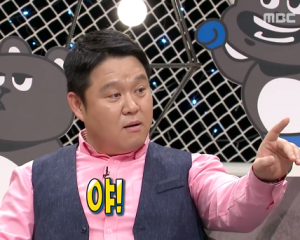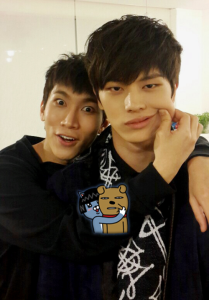 Between polls of who are the best leaders, questioning rotating leadership roles, and defining the different types of leaders in K-pop, the title of leader has become increasingly complex as more groups evolve with the shifting K-pop scene, and newcomers continue to add their own bid to the K-pop market.
Between polls of who are the best leaders, questioning rotating leadership roles, and defining the different types of leaders in K-pop, the title of leader has become increasingly complex as more groups evolve with the shifting K-pop scene, and newcomers continue to add their own bid to the K-pop market.
With more variety shows that try to playfully interact with idols, the leadership position has started to become one that bears the brunt of criticism or the sanctioned teasing (read: bullying) of a group. Most recently, Kim Gura threw a few barbs at BtoB‘s Eunkwang, questioning why Eunkwang deserves this title of leader.
To give some background, on MBC‘s Quiz Show To Change the World, Kim Gura, a TV personality known for his biting comments, lobbed criticism at Eunkwang after the latter spoke about being BtoB’s leader. Gura believes a leader should bring popularity to a group, and he believes Eunkwang doesn’t meet this requirement.
[youtube https://www.youtube.com/watch?v=f_Sua-YGlMI]Kim Gura has a very particular definition of leader, and it seems his criticism is also related to the increased popularity of BtoB’s maknae, Sungjae. Despite Eunkwang’s ability to sing well, Kim Gura still posits that a leader needs to be someone who can bring popularity to a group — rather than just contribute musically.
Idol popularity and how much each individual contributes to the welfare of a group have come up in the past. One such issue is profit sharing, which Kim Gura has vocally criticized in the past. After he explained why he believed the system was unfair, there was major backlash towards members of various groups (i.e. Miss A) whose individual activities do not compare to the most popular member of their group (i.e. Suzy), and therefore financially gain from their popular member’s solo activities via the profit sharing system.
 Miss A’s case is a bit different from BtoB because Miss A does not have a defined leader. After the profit sharing debate of 1/n (n number of members) came to light, there was backlash directed at the perception of the other members getting money for just being in the group and doing nothing while Suzy, who they see on dramas and commercials, has to split her solo work earnings with her other members.
Miss A’s case is a bit different from BtoB because Miss A does not have a defined leader. After the profit sharing debate of 1/n (n number of members) came to light, there was backlash directed at the perception of the other members getting money for just being in the group and doing nothing while Suzy, who they see on dramas and commercials, has to split her solo work earnings with her other members.
It probably would not matter to the public how much actual work Jia, Fei, and Min do individually because the vast differences in popularity levels between them and Suzy is like a lens that skews the public perception. However, Suzy did try to end this debate by posting a blurb explaining that at the beginning of her Miss A career, the profits were shared; but as time went by, the profits weren’t as easily defined as 1/n.
Based off his previous arguments, Kim Gura would seem to have a valid point in regards to BtoB. Sungjae does split his individual profits with his members, and that would seem inherently unfair to him to do more work while the other members reap his rewards. He fails to take into account that idol groups are typically designed to work in this manner.
At the beginning, they are created with different personalities, characters, and members in hopes that some members will find popularity with the masses. However, in the idol world, popularity wanes and waxes. To an extent, being in a group serves as a launching pad for an individual’s career. Nowadays, many idols are diversifying their portfolios to include acting or variety. It does beg the question, though: would they have gotten these opportunities had they been a solo act instead?
On another note, the popular member and the one that is in demand are oftentimes based off who the public find visually attractive. The face/visual of the group is usually the one who gets those commercials, variety appearances, and later on the drama roles. So for these very high profile roles, that person will be perceived as the one doing work. This is something that Eunkwang himself admits.
He states that in another life, he wishes he could be born as Sungjae. It is a humiliating thing to accept that you can only change so much of yourself. Ultimately, you are born as you are, which does function as a catch-22 in the industry. If you change too much of your outer appearance via plastic surgery, you will get harsh rebuke; but accept the way you look and you may face criticism for your lack of popularity in your group.
 So what can the other members do if the public is not as receptive to them as they are with the most visible member in the group? Eunkwang has rightfully tried to utilize his talents to amass fans, and his value in that aspect is not easily quantifiable. Should the member that brings the most amount of fans to a group hold more weight in determining who deserves the title of leader?
So what can the other members do if the public is not as receptive to them as they are with the most visible member in the group? Eunkwang has rightfully tried to utilize his talents to amass fans, and his value in that aspect is not easily quantifiable. Should the member that brings the most amount of fans to a group hold more weight in determining who deserves the title of leader?
While that factor is important, individual popularity does not necessarily equate to group popularity. An individual can be popular in their own right, but if their group doesn’t deliver with music or a concept, then their individual popularity can only do so much as a gateway.
And that perhaps is only the tip of the iceberg when it comes to what factors are important for determining each member’s value. Sungjae may have given BtoB access to a larger audience but to retain that audience and convert them to dedicated fans is another critical component to consider. A member’s role (outside of being a leader) is fluid, and that is why group dynamics and talents are important in a group’s conception.
The member who converts someone to a dedicated fan may not necessarily be the most popular one. Maybe it was another member’s composition that really struck a chord with a fan; or another member’s singing that made fans keep up with a group, or another member’s athletic ability that inspired some fans to listen to more of their songs, buy their CDs, or attend their concerts. For BtoB’s career progression so far, their growth has been more of a progress in waves. To boil down a group’s success to a single member, with explosive popularity in the past year, would negate the hard work the others have also put in so far.
Furthermore, I am not sure where Kim Gura got his definition of a leader from. In a good amount of idol groups, the leader is determined by age, with the eldest often assuming that role. When did being considered a leader of a group take on this responsibility of needing to be the most popular one?
Being a leader is not that glorifying either. Take a look at how Weekly Idol treats the leaders of groups. While it may be in jest, the leaders usually have to bear more weight in different areas than simply just bringing popularity to their group. They are the ones to take on criticism or teasing. They have to acknowledge the pitfalls or weaknesses of their group. These are just some of the things that leaders are continuing to take on as duties that don’t make it such an glorified role.
Aside from that, there is another factor that comes in play — the maintenance of the group. A leader has certain responsibilities in maintaining the relationships and functionality of a group. In the past, BtoB has acknowledged that no other member could take on the leadership of the group aside from Eunkwang. For the group to maintain their group dynamics and not hate performing with one another, is a testament to the leader being able to handle all those different personalities, diffuse tension, and mediate conflicts.
 Which may bring up an interesting idea that may counter the idea of a black hole member. How much of their role in maintaining the fabric of a group do we not see? One such member is Jihyun of 4Minute.
Which may bring up an interesting idea that may counter the idea of a black hole member. How much of their role in maintaining the fabric of a group do we not see? One such member is Jihyun of 4Minute.
Some people claim that she is a black hole member of her group. When evaluating the perception of her talents and popularity, this may appear to be the case. But if we consider the longevity of 4Minute and how the group has continued to maintain great chemistry with one another, couldn’t that be a positive credit attributed towards the leader who plays a greater role in the maintenance of a group?
Btob’s Eunkwang may not have the visibility of Sungjae, but I think Kim Gura was definitely off in his assessment of what factors should be more important in determining a leader. A leader’s role is so much more than only bringing popularity to a group. They have a lot of hats they are forced to wear, so it is a bit unfair to hold them solely responsible for all things in a group — especially when popularity is not easily manufactured for an individual. And when a leader is chosen, it’s often because of many other reasons aside from a yearbook vote of most likely to be popular.
Is Kim Gura a troll or do you agree with his points? Are there leaders of certain groups that you believe don’t get the credit that they deserve for their role in keeping together a K-pop group?
(Images via MBC, Cosmopolitan, Cube Entertainment via Btobsgsupport, and High Cut Magazine; Sports Seoul translation via LoveInDaCube, MBC Quiz To Change The World via Naver, Osen translated via BTOB_Mel, Naver, Pann via Nate)



